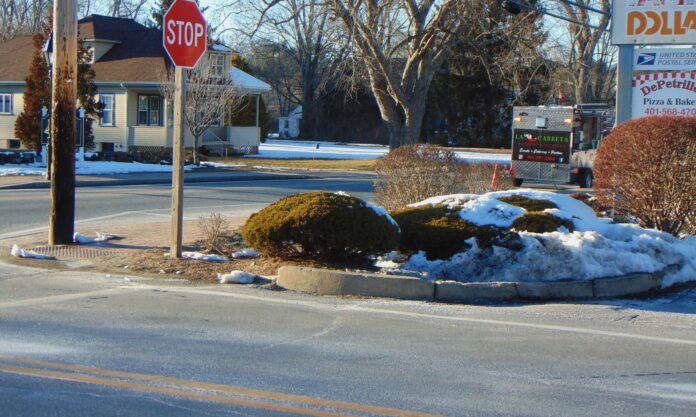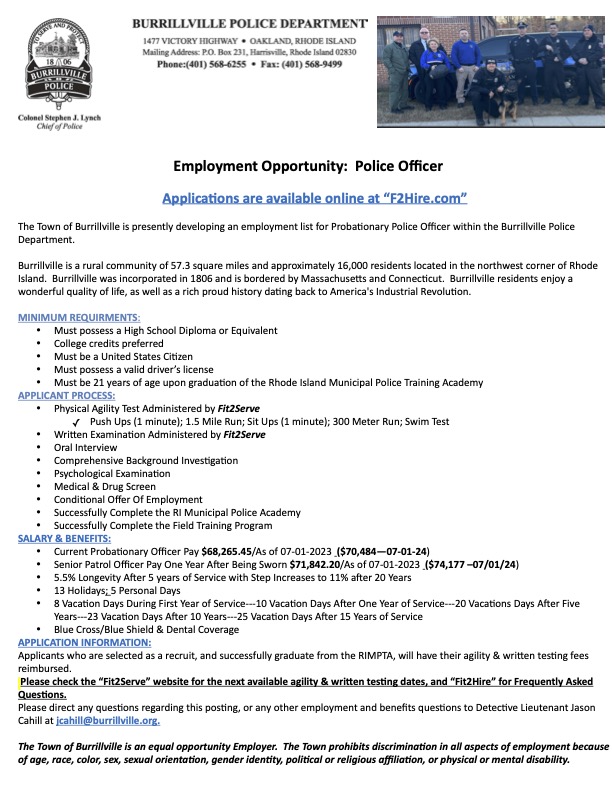
GLOCESTER – Food trucks parked along Putnam Pike in Chepachet Village are raising safety concerns among residents.
At the recent Glocester Town Council meeting, Councilor Cheryl Greathouse questioned if police Chief Joseph DelPrete could remove or move food trucks causing safety concerns, particularly at the corner of Douglas Hook Road and Putnam Pike, the main street. Pulling out from Douglas Hook, agreed councilors, is difficult and potentially dangerous due to a lack of room and the inability to see oncoming traffic when food trucks are parked there.
“We discussed it at the last meeting,” said Greathouse. “And we did find out that if it’s a serious/dangerous situation to have the food trucks parked on the street, the chief can request that they are not there.”

While there were concerns about safety, there were also concerns about the legality of removing vehicles from a state road for safety reasons.
“We found out last meeting that is a possibility,” Greathouse said. “I’m not saying I want that to happen, but is should be open to discussion.”
Greathouse had previously suggested making use of the town pavilion for food trucks, which would make parking easier and move the vehicles from the locations in the middle of the village along Putnam Pike. She added that the council could vote to allow food trucks to use the pavilion. Currently, town regulations prohibit that use on a regular basis.
“I understand everybody’s concern where the placement of food trucks are because I pull out of the same parking lots everyone else does,” said Council Vice President Stephen Arnold. “Do I have a great solution? No, but I am concerned about putting them in the pavilion for a number of reasons. One is having four or five private businesses’ home based on town property, whether that means liability or what are we doing for other private businesses.”
The pavilion lot is typically shut down after candlelight shopping in December, he added.
Council President William Worthy asked town Solicitor David Igliozzi what liabilities the town would incur if food trucks were allowed to use the pavilion. Igliozzi explained that vendors would need to get special insurance on their own to make them responsible for any liabilities that may occur and remove the town from those potential liabilities. Town employees are automatically covered, he added, but private citizens are not.
“They have to provide specific insurance that indemnifies and insures the town,” he said.
“I would be concerned about utilizing that for private business,” Arnold said. “But, the point on the traffic and the safety, I mean, that’s real. I hear you loud and clear on that.”
Some food trucks are located in safer places, he added. Others create problems. DelPrete agreed.
“The most dangerous spot is heading east to west on Main Street,” said DelPrete. “You lose that line of sight coming out. Main Street is busy. They are there during our busy hours, especially late afternoon or early evening. There is a lot of traffic. I’m not sure what I can do to enforce that. It is a state road.”
He added he would contact the state traffic safety commission to determine the legality of local law enforcement removing vehicles from state roads that are parked in legal parking areas.
“If he was parking in a prohibitive area, like the corner where the angle is, the X, then we could do something,” explained DelPrete, “but I can’t say, ‘hey, you have got to get out of a lawful parking spot.'”
The chief pointed out that a regular vehicle parked in the same spot, particularly a large pick-up truck or van, causes the same problem. When asked if there had been many accidents there, he said there have been accidents, but not a lot.
“It is a tough spot,” DelPrete said.
Greathouse said there are already places in town where the town prohibits vendor parking.
“In that ordinance there are seven places where we specify where they can’t be,” Greathouse said. “Most of those are state roads. Also they can’t stay there all day, legally.”
The legal limit is four hours, she added.

Town Clerk Jean Fecteau agreed with Greathouse’s suggestion that the town could enforce no parking in certain areas, regardless if it is a state road or not.
“The reason I think maybe we can is because we are already saying you can’t park at Route 44 and 102, you can’t park at Route 44 and 100,” said Fecteau. “These are all state roads. It is in our ordinance.”
“They’re parked in a lawful parking spot,” said DelPrete. “What do I have to do?”
“If our ordinance says they can’t park there, even if it is a lawful parking spot, what does that mean?” asked Councilor Jonathan Burlingame.
“So, you’re prohibiting all food trucks on Main Street?” asked DelPrete.
“No, just designated spots,” responded Steere. “The ordinance hasn’t really been tested.”
Igliozzi explained the ordinance is consistent with mobile food truck ordinances that were adopted throughout the state, based on a state law that gave municipalities certain authorities. The chief, he added, could ask any food truck to move under dangerous conditions.
“There are two issues,” said Igliozzi. “One, what location does the chief think should be prohibited? Period. No longer lawful for anyone. You could change that. I’ve got to believe you have jurisdiction for safety purposes in the town.”
“And we’ve done that,” said DelPrete. “But, if it is a lawful spot that doesn’t present a problem, where do I go from there?”
“I think state law provides that clearly the chief can designate locations that you think are dangerous, then you notify the council and the council puts it in the ordinance,” said Igliozzi.
The solicitor noted that the chief can’t just walk around and remove vehicles parked in lawful spaces, but he can designate certain areas where parking is prohibited. To do so, a hearing would have to be held regarding the change in the ordinance then a vote taken to make it legal. He added that it could be written to prohibit food trucks, but not regular vehicles.
In the interim, DelPrete said he would contact the state safety commission for further information regarding jurisdictions.






